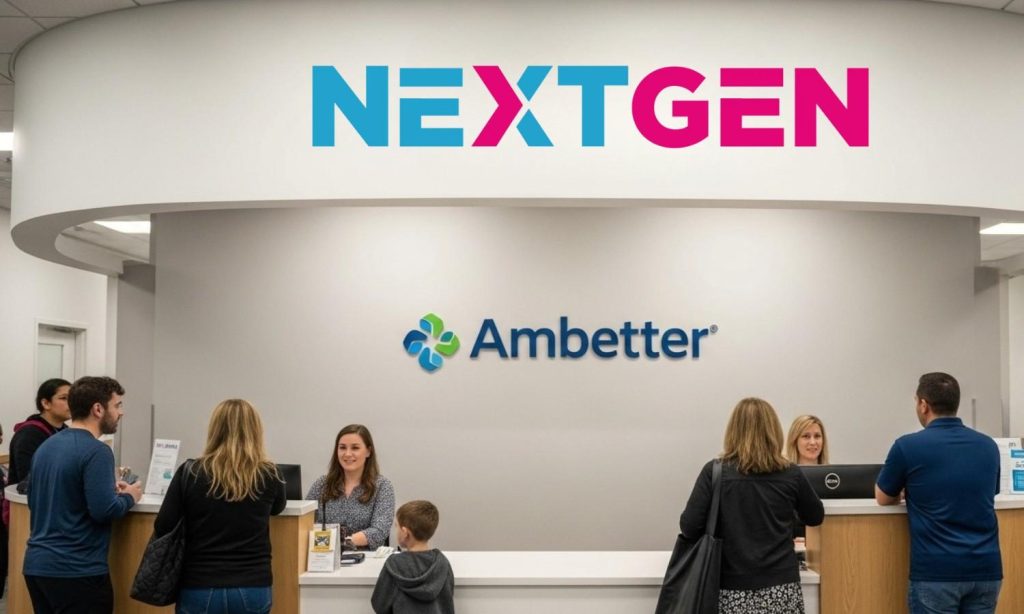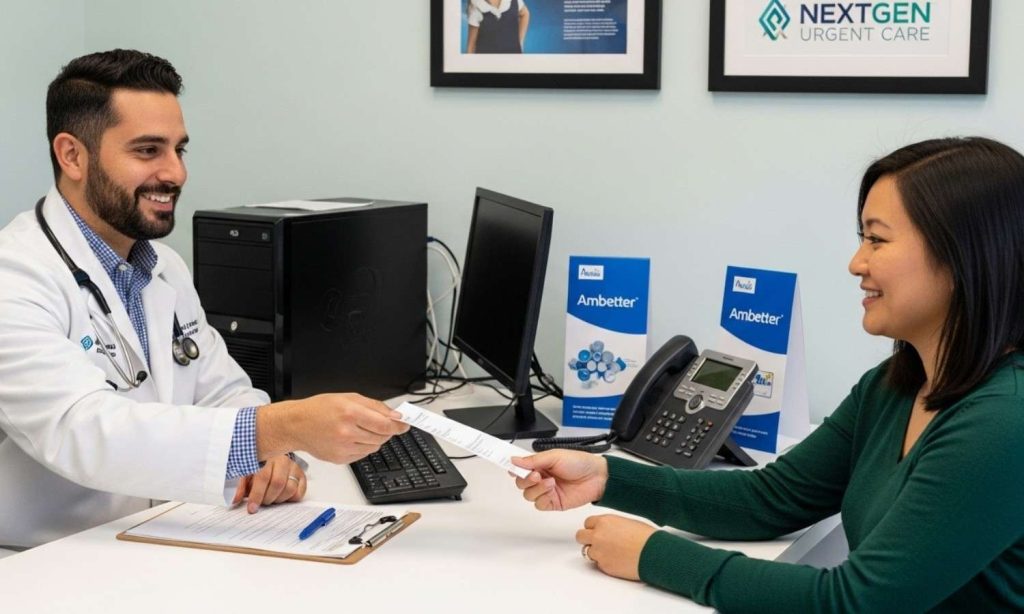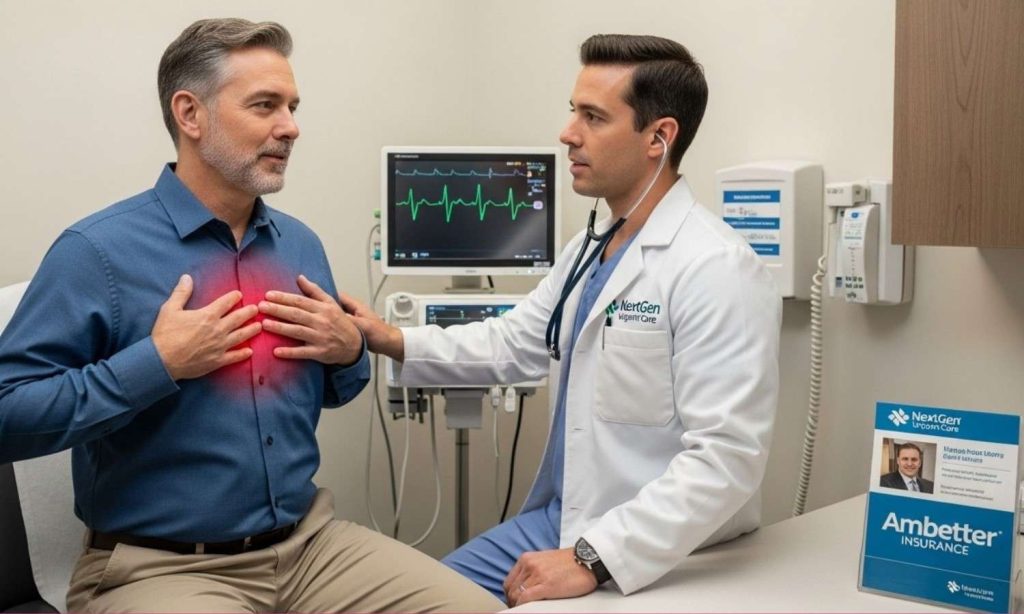Should I Go to Urgent Care for Back Pain?
July 29, 2025
Back pain is one of the most frequent reasons people seek medical attention, affecting millions of individuals each year. It can appear suddenly after lifting something heavy or develop gradually due to poor posture, repetitive movements, or underlying health conditions. While some cases resolve with rest and over-the-counter medications, others persist or worsen, leaving many wondering whether they should seek professional care—and if so, where.
One common question people ask is: Should I go to urgent care for back pain? The answer depends on several factors, including the severity of your symptoms, how long they’ve lasted, and whether you’re experiencing any additional warning signs. Knowing when urgent care is appropriate—and when a different level of care is needed—can help you get the right treatment without unnecessary delays or expenses. This article explains when back pain can be treated at an urgent care center, what symptoms require emergency attention, and what you can expect during an urgent care visit. Whether your pain is new, worsening, or affecting your daily life, understanding your options can help you make an informed and confident decision about your care.
What Causes Back Pain?
Back pain can stem from various causes, ranging from minor muscle injuries to more serious medical conditions. Knowing the potential source can guide your decision about whether urgent care is appropriate.
Mechanical Issues
The most common back pain causes involve muscles, ligaments, and discs. Improper lifting, repetitive movements, or sudden twisting motions often lead to muscle strain or ligament sprains.
Posture and Lifestyle
Poor sitting or standing posture—especially for people who work at desks or stand for long hours—can strain the lower back over time. Inactive lifestyles may weaken core muscles, making the spine more vulnerable to pain.
Degenerative Conditions
Conditions like osteoarthritis, degenerative disc disease, and spinal stenosis often develop gradually and result in chronic discomfort. These conditions may flare up periodically and can be evaluated in urgent care if symptoms worsen suddenly.
Underlying Health Issues
In rare cases, back pain can indicate infections, kidney stones, or even tumors. Though uncommon, these conditions tend to present with other symptoms like fever, weight loss, or abnormal bloodwork.

When Is Urgent Care the Right Choice?
Urgent care centers bridge the gap between emergency services and routine doctor visits. They’re ideal for conditions that need timely care but aren’t severe enough for the ER.
1. The Pain Is Sudden and Severe
Back pain that starts abruptly and doesn’t respond to self-care measures may indicate a strain or a disc issue. Urgent care can quickly evaluate the source and offer targeted relief. Pain that prevents you from sitting, walking, or sleeping comfortably should be addressed promptly.
2. The Pain Has Persisted for Days
Ongoing pain—even if it’s manageable—may point to an underlying problem that isn’t resolving. If you’ve tried rest, heat or ice, and over-the-counter pain medications without improvement after 3–5 days, a professional evaluation is warranted.
3. You Can’t Reach Your Primary Care Doctor
Waiting days or even weeks for a primary care appointment isn’t ideal when you’re in discomfort. Urgent care offers walk-in visits, extended evening hours, and weekend availability—making it more convenient when you need prompt attention.
4. You Suspect a Muscle or Soft Tissue Injury
If you injured your back during exercise, lifting, or a fall (but not severely enough to go to the ER), urgent care can assess the damage. They can check for sprains, strains, and mild disc herniations using basic imaging and clinical exams.
5. You Need Imaging or Prescription Medications
Urgent care centers often have in-house X-ray machines to help identify fractures or misalignments. While they don’t typically offer MRIs, they can provide referrals if needed. They also prescribe medications like NSAIDs, muscle relaxers, and pain relievers.
When Back Pain Is an Emergency
While urgent care is suitable for most types of back pain, some symptoms should never be ignored. If you experience any of the following, go to the emergency room or call for immediate help:
Loss of Bladder or Bowel Control
This could signal cauda equina syndrome, a rare but serious condition that requires immediate surgical attention to prevent permanent nerve damage.
Numbness or Weakness in the Legs
Back pain accompanied by tingling, numbness, or difficulty walking may be due to nerve compression. While urgent care can offer initial assessment, sudden neurological symptoms often need advanced imaging and emergency evaluation.
Fever with Back Pain
This could indicate a spinal infection or kidney infection. When paired with chills, malaise, or recent surgeries, back pain with fever must be taken seriously.
Trauma from Falls or Accidents
If you’ve been in a car crash or had a significant fall, your spine may be injured. Even if the pain seems manageable at first, trauma should be evaluated in an emergency department, especially in older adults or those with osteoporosis.
Unexplained Weight Loss
Sudden weight loss with back pain might indicate a systemic issue, such as cancer or an infection. This combination warrants a comprehensive workup.
What to Expect During an Urgent Care Visit for Back Pain
1. Thorough Medical History
You’ll be asked about when the pain started, where it’s located, what makes it better or worse, and if you’ve had similar issues before. Mention any injuries, recent infections, or other symptoms.
2. Physical Examination
The provider may check your posture, spinal alignment, mobility, reflexes, and strength. This helps identify whether your pain is muscular, neurological, or joint-related.
3. Diagnostic Tests
If needed, the clinic may perform an X-ray to rule out bone fractures or joint problems. While they usually can’t do MRIs on-site, urgent care can refer you for one if disc or nerve issues are suspected.
4. Treatment Plan
This could include:
- Short-term medications to manage inflammation or muscle spasms
- Guidance on heat vs. ice therapy
- Activity restrictions or modifications
- Referrals to physical therapy, orthopedics, or neurology if needed
5. Follow-Up Recommendations
You may be asked to follow up with your primary care doctor or a specialist for ongoing care, particularly for chronic or recurring issues.
Urgent Care vs. Primary Care vs. Emergency Room
| Setting | Use For | Pros | Cons |
| Urgent Care | Sudden back pain, minor injuries, worsening chronic pain | Fast, convenient, affordable | Limited imaging and no long-term care |
| Primary Care | Ongoing back issues, maintenance care | Comprehensive history, chronic care management | Long wait times, limited hours |
| Emergency Room | Trauma, loss of control, severe symptoms | Immediate access to tests and surgery | High cost, longer waits for non-critical issues |
Understanding the differences helps you avoid both overreaction and under-treatment.
How Urgent Care Clinics Treat Different Types of Back Pain
Acute Lower Back Pain
Often caused by overexertion or poor movement, acute pain is treated with rest, heat therapy, short-term medication, and simple stretches. Urgent care can guide you through home recovery steps.
Sciatica or Nerve-Related Pain
Sharp, shooting pain that radiates into your leg often indicates sciatic nerve involvement. Urgent care can prescribe anti-inflammatory medication and refer you for imaging or specialist consultation if needed.
Pain From Overuse or Poor Ergonomics
Prolonged sitting, heavy lifting, and poor posture can cause chronic strain. Providers might suggest physical therapy or ergonomic adjustments at home and work.
Preventing Back Pain After Treatment
Once the pain subsides, staying pain-free is a key goal. Urgent care providers may suggest:
- Daily stretching and core strengthening
- Ergonomic changes at your workstation
- Proper lifting techniques using legs rather than the back
- Frequent breaks from sitting or standing
- Weight management and staying active
For patients with recurring issues, follow-up care with physical therapy or a spine specialist may be recommended.

Common Misconceptions About Back Pain and Urgent Care
“Only the ER Can Treat Back Pain”
Not true. Unless you have red-flag symptoms, urgent care is well-equipped to handle many back issues.
“You Need a Referral to Visit Urgent Care”
You don’t. Urgent care is open to everyone—no appointment or prior approval needed.
“Urgent Care Doesn’t Have X-Rays”
Many modern clinics have on-site imaging, allowing for faster diagnosis of musculoskeletal problems.
NextGen Primary Care Doctor Walk-in Clinic Houston & Urgent Care Serving the Sharpstown Community and Beyond in Houston
NextGen Primary Care Doctor Walk-in Clinic Houston & Urgent Care is dedicated to serving the diverse needs of the local community of Houston, including individuals residing in neighborhoods like Sharpstown. With its convenient location near landmarks such as St. Luke’s United Methodist Church Gethsemane and major intersections like Bellaire Blvd & Cannock Rd (coordinates: 29.70321336999423, -95.50934037002709), we offer Urgent Care with Ambetter Coverage services.
Get Urgent Care with Ambetter Coverage Services at Sharpstown Now
Navigate from Sharpstown to NextGen Primary Care Doctor Walk-in Clinic Houston & Urgent Care Now
Final Thoughts:
In most non-emergency situations, urgent care is an excellent option for managing back pain. Whether the discomfort is new, worsening, or interfering with daily activities, getting a timely assessment helps prevent complications and speeds up recovery.However, if you experience severe symptoms like numbness, fever, or trauma-related pain, do not delay—head straight to the ER.By choosing the right type of care, you save time, reduce costs, and get the appropriate treatment when you need it.
Frequently Asked Questions (FAQs)
1. What types of back pain can urgent care treat?
Urgent care clinics can treat a wide range of back pain issues, including muscle strains, soft tissue injuries, mild disc problems, and sudden flare-ups of chronic conditions. They are ideal for cases that are painful but not life-threatening.
2. When should I skip urgent care and go to the emergency room for back pain?
You should go to the ER if you have back pain with symptoms like numbness or weakness in your legs, loss of bladder or bowel control, fever, recent trauma, or unexplained weight loss. These may indicate serious conditions requiring immediate evaluation.
3. Does urgent care offer imaging like X-rays for back pain?
Yes, most urgent care clinics have on-site X-ray equipment and can use it to check for fractures, joint issues, or alignment problems. If more advanced imaging like an MRI is needed, they can refer you to a specialist facility.
4. Will I get medication for back pain at urgent care?
Yes. After evaluating your condition, urgent care providers may prescribe medications such as anti-inflammatories, muscle relaxants, or short-term pain relievers to help manage your symptoms.
5. What should I do if my back pain doesn’t improve after visiting urgent care?
If your symptoms persist or worsen after initial treatment, it’s important to follow up with your primary care doctor or a specialist. You may need further imaging, physical therapy, or ongoing care for a more accurate diagnosis and long-term management.
Primary Care Join a team that’s passionate about compassionate, patient-first care. At NextGen Primary Care, your work truly makes a difference every day. or Call Us at (281) 888-7289
Related Posts
How Late Is Urgent Care Open?
Does Urgent Care Prescribe Pain Meds?
Can You Go to Urgent Care for Chest Pain?
Walk In Anytime. We’re Ready
Whether it’s a sudden illness, minor injury, or something that just can’t wait — we’re here to provide fast, compassionate care when you need it most. No long waits, no unnecessary stress — just quality healthcare, right when it matters.
Convenient
Location
Call or Walk-In.
No Appointment Needed
Extended Hours,
7 Days a Week




